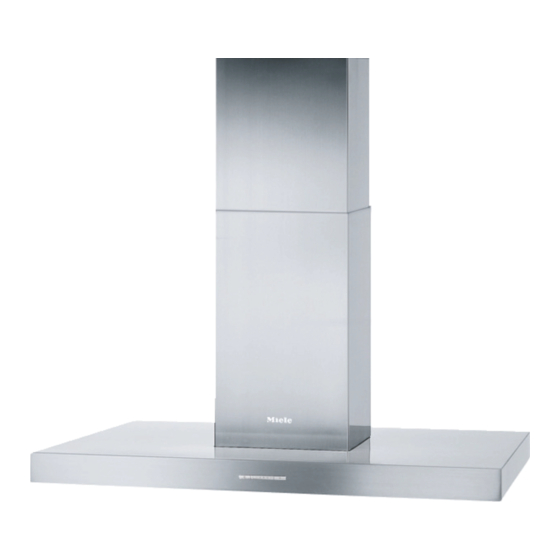Miele PUR 98 D Instructions d'utilisation et d'installation - Page 33
Parcourez en ligne ou téléchargez le pdf Instructions d'utilisation et d'installation pour {nom_de_la_catégorie} Miele PUR 98 D. Miele PUR 98 D 40 pages. Ventilation system
Également pour Miele PUR 98 D : Instructions d'utilisation et d'installation (44 pages), Instructions d'utilisation et d'installation (48 pages), Instructions d'utilisation et d'installation (44 pages), Manuel (48 pages)

WARNING: Danger of toxic fumes.
Gas cooking appliances release
carbon monoxide that can be
harmful or fatal if inhaled.
To reduce the risk of fire and to
properly exhaust air, the exhaust
gases extracted by the hood should
be vented outside of the building
only.
Do not vent exhaust air into spaces
within walls or ceilings or in attics,
crawl spaces or garages.
To reduce the risk of fire, only use
metal ductwork.
Please read and follow the
"IMPORTANT SAFETY
INSTRUCTIONS" to reduce the risk
of personal injury. Follow all local
building codes when installing the
hood.
Only use smooth pipes or flexible
duct hoses made from non-
combustible materials for exhaust
ductwork.
To achieve the greatest possible air
extraction with the lowest noise levels,
please note the following:
– The diameter of the exhaust duct
should not be less than 6" (150 mm).
– If flat exhaust ducts are used, the
cross section should not be smaller
than that of the exhaust connector.
– The exhaust duct should be as short
and straight as possible.
– If elbows are needed, make sure they
have a large radius.
– The exhaust duct itself must not be
kinked or compressed.
– Make sure that all connections are
secure and airtight.
Remember that any constriction of
the airflow will reduce extraction
performance and increase operating
noise.
If the exhaust duct is to be routed
through an outside wall, we
recommend installing a telescopic
wall vent or a rooftop vent (available
as an optional accessory).
If the exhaust air is conveyed into an
exhaust air chimney, the inlet
connector must face the flow
direction.
When installing the exhaust duct
horizontally, a minimum slope of ¹/
₈ inch per foot must be maintained to
prevent condensate from flowing into
the ventilation hood.
If the exhaust duct is to be routed
through cool rooms, ceilings, etc., the
temperatures in these different areas
may differ greatly. Therefore water
condensation must be considered
and the exhaust duct will need to be
insulated.
Air venting
33
